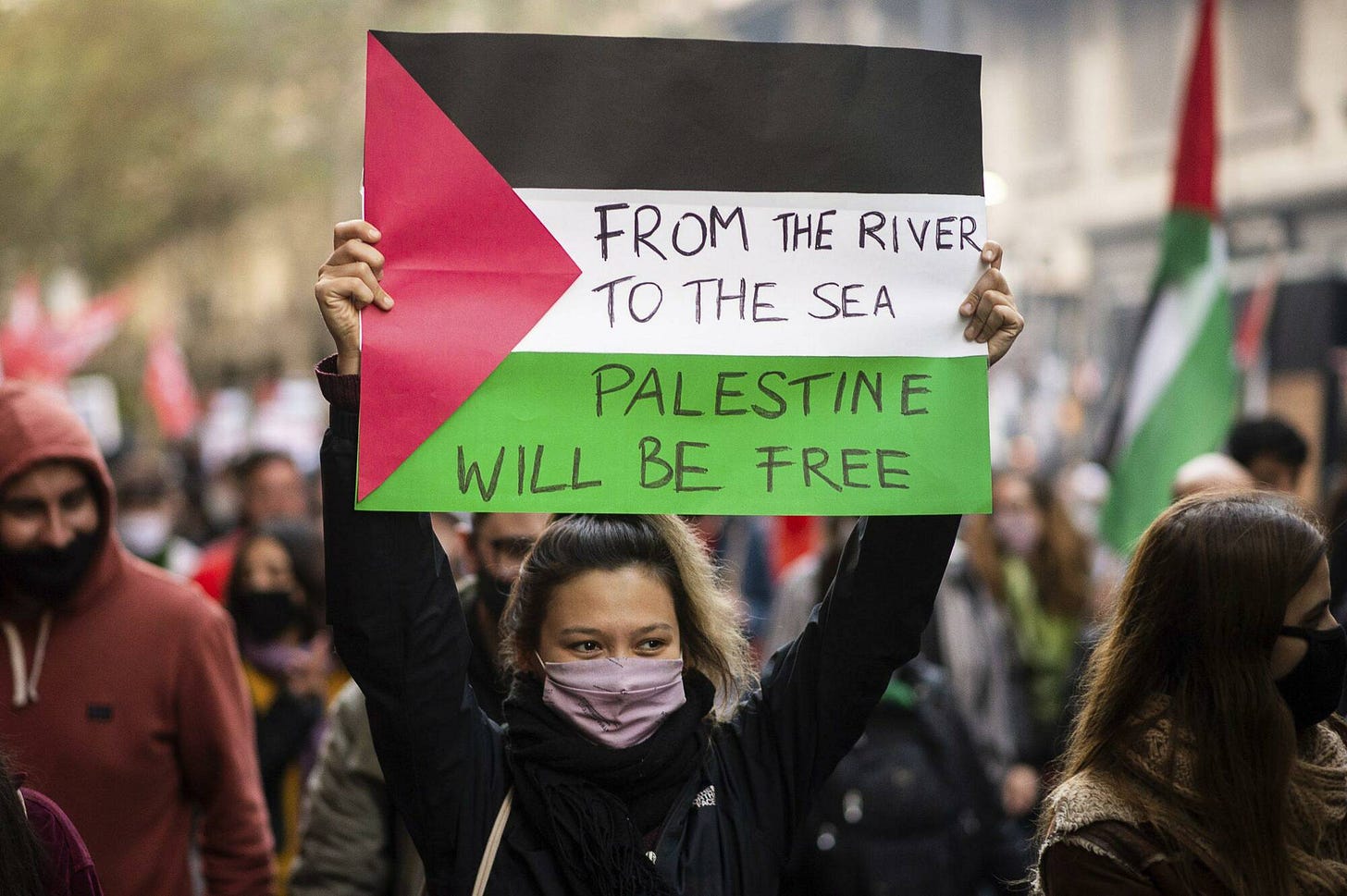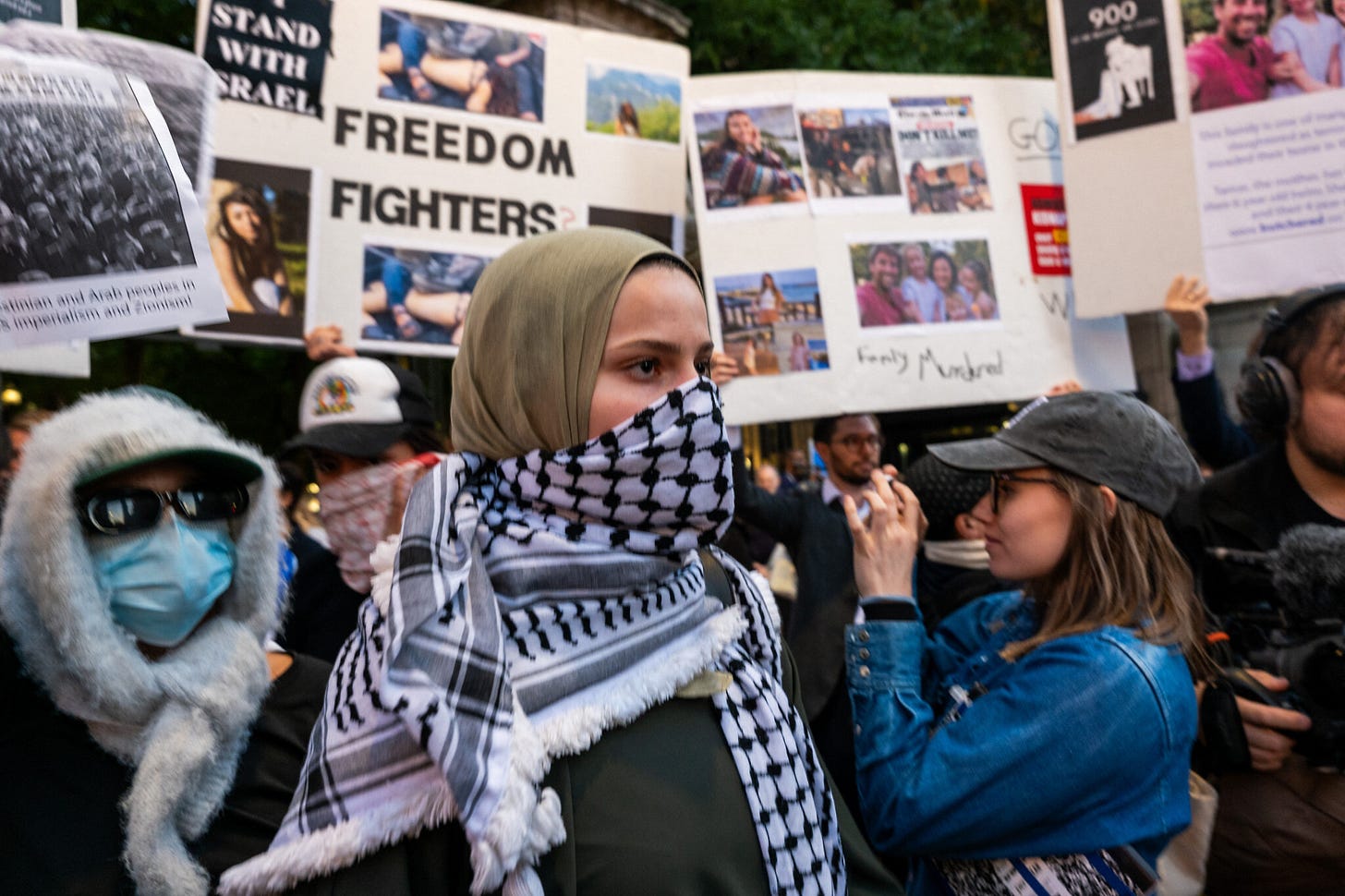On Israel's Right to Exist as Pretext for Backlash
We are reading Except for Palestine with a tremendous sense of urgency and sorrow. Before going any further, we want to acknowledge the toll the last 30+ days have taken on the Palestinian people who are living moment by moment in fear for their lives while actively grieving the deaths of family, friends, and fellow Palestinians all around them. To say the situation is dire does not begin to describe the horror to which we are all bearing witness.
While broadly, we understand the necessity for international solidarity to achieve abolition, the massacre and war crimes happening right now in Gaza, and increasingly the West Bank, offer a grim window to the brutal, dehumanizing possibilities that await any people who dare to resist, to fight for liberation, to insist upon their humanity and indeed their very existence.
The first chapter of Except for Palestine delves into the question of the right to exist. The nation-state of Israel has effectively centered its “right to exist” in discussions about Palestine. Chapter one illuminates, with a methodical, historical analysis, the origins of what has become a central question. And it is within that context that we can only begin to understand last week’s chilling examples of the unprecedented backlash against those who dare to speak in support of Palestine. Without question, there are many stunning examples of backlash: individuals losing employment and being subjected to harassment. But these two examples are particularly noteworthy and instructive as they relate to understanding how the question of Israel’s “right to exist” is weaponized to shut down the debate about Palestinian rights.
1. House Representative Rashida Tlaib's censure is a rare act of Congressional reprimand. Those who voted in favor of the censure, including House minority leader Hakeem Jeffries’ pointed to the phrase “from the river to the sea” as justification for their vote in favor of censure, interpreting the phrase as a call for the destruction of Israel. That interpretation of the phrase should not be taken at face value and must be viewed in the context of those who have historically used the phrase as a call for justice and equality for Palestinians. “From the Jordan River to the Mediterranean Sea” refers to all the land of historic Palestine. It doesn’t call for the destruction of Israel but rather a single state. Nor is it a call to remove Jewish people from Israel. As Marc Lamont Hill explains, Israelis have also used the phrase. Rashida Tlaib even clarified her statement to reiterate that she used the phrase to call for liberation and freedom for Palestinians. And yet, 234 members of the U.S. House voted for Tlaib’s censure, an undeniable example of the Palestinian exception at work in real-time.
*Of note, another instance of Congressional censure occurred in 1842 when Joshua Giddings, a leading abolitionist of the era, was censured for Introducing an anti-slavery resolution deemed to be incendiary and a violation of the gag rule prohibiting discussion of slavery. Liberation has always been a threat to Empire.
**Also of note, Harvard President Claudine Gay, notably Harvard’s first Black president, condemned the phrase “from the river to the sea” in a letter to students and alumni on November 9, 2023.
2. The suspension by Columbia University of the chapters of Students for Justice in Palestine and Jewish Voice for Peace is effectively an attempt to silence their voices by cutting off the groups’ University funding and eligibility to hold on-campus events through the end of the fall term. This attack on student voices shows the depth of the Palestinian exception as the shabby rationale for the suspension stuns academia. Though the official reason given for the suspension cites the groups’ failure to receive necessary approvals, the Ivy League has seen a steady stream of donors withdraw their financial support because of pro-Palestinian demonstrations and objections to the phrase “from the river to the sea” or even “Free Palestine.”
While the power brokers in the U.S. have bought into the rhetoric that anyone who dares to speak about Israel must also declare its “right to exist,” examining the origins of what has become a requirement to guard against charges of anti-Semitism is crucial at this moment. We must be able to stand knowledgeably and firmly in support of Palestinians without succumbing to a false narrative enacted to de-legitimize the rightful claims of Palestinians for freedom and equality.
The stunning efforts to quell calls for a ceasefire, support for the liberation of Palestinians, and calls to end U.S. support and funding for the massacre currently unfolding under Israel’s regime can only be understood in the context of the Palestinian exception Marc Lamont Hill and Mitchell Plitnick outline in Except for Palestine: The Limits of Progressive Politics. This understanding is crucial as we continue to resist this assault on the Palestinian people.
And please save the date for our discussion of Except for Palestine on Wednesday, November 29, 2023 at 6pm ET.
Please share your thoughts and questions as you read along. We are eager to learn together and deepen our understanding of the absolute necessity of fighting for the rights of Palestinians. We will continue to hold the Palestinian people in our hearts as we engage in resistance efforts calling for an immediate ceasefire. While a ceasefire IS of grave importance, it is also the mininum ask. We know that the work to secure liberation for Palestine must continue beyond a ceasefire. Fighting for Palestine is tantamount to fighting for the humanity of us all.





